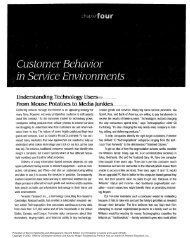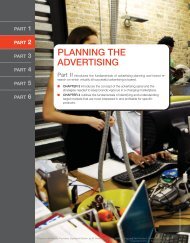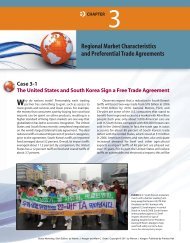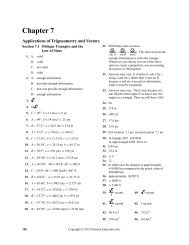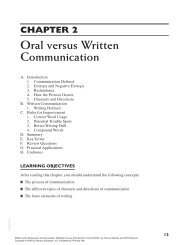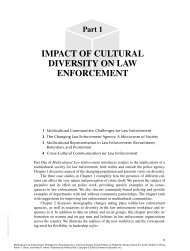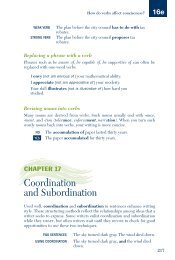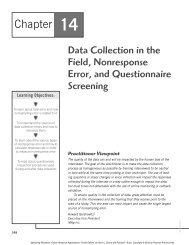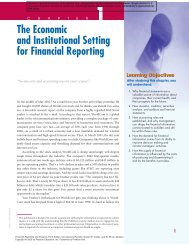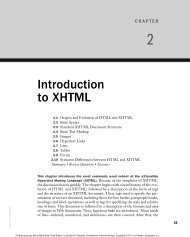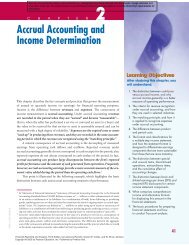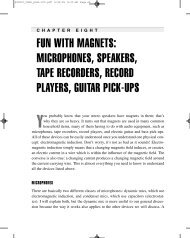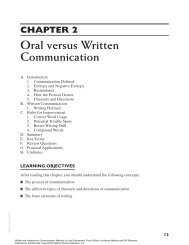MANAGEMENT COMMUNICATION - Pearson Learning Solutions
MANAGEMENT COMMUNICATION - Pearson Learning Solutions
MANAGEMENT COMMUNICATION - Pearson Learning Solutions
Create successful ePaper yourself
Turn your PDF publications into a flip-book with our unique Google optimized e-Paper software.
Chapter 3 ● Communication Ethics 83000200010270582216customers, with build-to-order systems andcomprehensive services that fulfill the needsof its customers. Dell’s customers range frommajor corporations to individuals all over theworld. Efficient cash management hasenabled Dell to have both extremely highinventory returns and a “negative cashconversion cycle.” 3 This cash flow systempermits Dell to pass on cost savings tocustomers in the form of lower prices forthe best technology available. These competitiveadvantages have helped the companyachieve a solid cash position withoutstanding liquidity.In Search of a Company CultureThe culture at Dell had always been drivenby a continuous program to drive down costsand improve the “customer experience.”Facts were more important and more highlyvalued than emotions and personal feelings.As the company grew and succeeded, thecompany culture that pushed the drive to benumber one and to make a personal fortunewas based solely in economic terms. But inthe year 2000, Dell’s margins in the hardwarebusiness began to decline due to aslowing demand for PCs and a price warwith competitors. Investors were disappointed,layoffs were frequent, and employeesbegan to wonder why they worked in ahigh-tech industry, and why they worked forDell.Kevin Rollins was aware that all greatcompanies have great cultures. They have apurpose and a leadership model. Aware of anurgent need to define his company’s culture,he looked for inspiration, reading books onFranklin, Jefferson, Monroe, andWashington. He soon discovered that whatthe founding fathers of the United Statesbelieved in went well beyond logic. Theywere passionate, idealistic, and had a visionthat exceeded their personal gain andinvolved the risk of losing their lives.Mr. Rollins found this remarkable, and itcaused him to think about the country’s souland its leaders. He believed this was an“interesting paradigm for a company toexamine, as opposed to simply adopting thebusiness paradigm.” 4 With this foundation,he began to develop what became known asThe Soul of Dell.The Events of September 11, 2001The tragedy of September 11, 2001, was aturning point that brought new warmth to thecompany’s changing culture. Instinctively,employees began reaching out to customersand the company put aside the usual economicmeasures of success to help the country getback to normal. Immediate effort was made toprovide equipment to customers who losteverything in the attack and needed technologyinfrastructure as soon as possible. Priority wasgiven to customers who needed hardware tohelp others, like [the] American Red Cross andthe United States Defense Department. Byparticipating in this initiative, employees saidthey felt proud of their work, and found that ithelped them stay focused in the effort torebuild their customers’ world. It createdcompanywide inspiration and made employeesproud of working at Dell. Overwhelmingly,felt [they] were doing the right thing. This collaborativeeffort brought the company togetheras never before and established a much-neededcompany affinity and loyalty. 5 Internal communicationin the company was also dramaticallychanged. Managers reached out toemployees on an emotional level by changingboth the tone and content of their conversations.People began talking about personalanecdotes, instead of facts and figures. Theway in which employees talked to one anotherwas transformed. Executives also changedManagement Communication: A Case-Analysis Approach, Fourth Edition, by James S. O'Rourke, IV. Published by Prentice Hall. Copyright © 2010 by <strong>Pearson</strong> Education, Inc.



